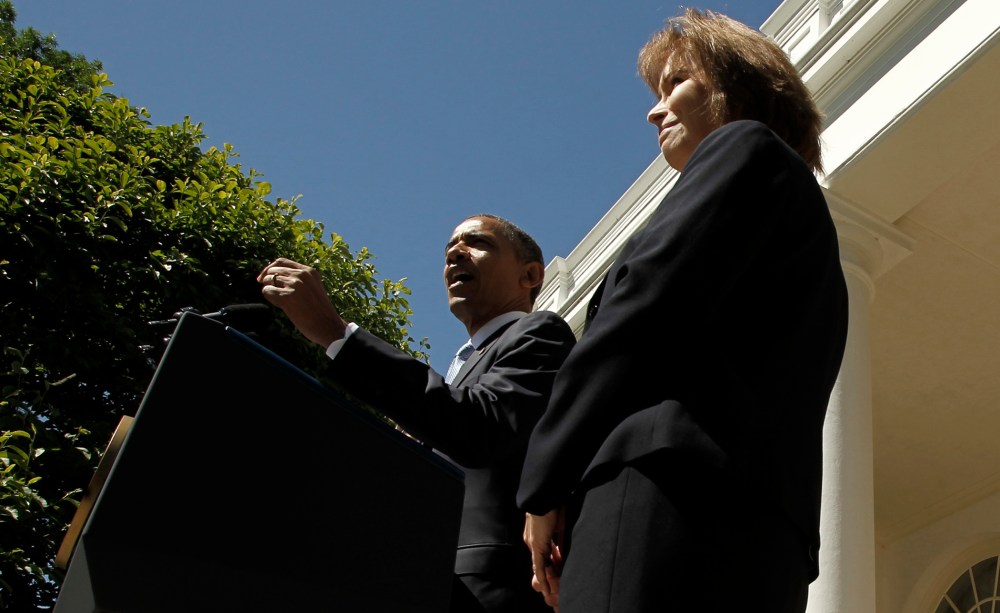Patricia Millett, nominated to sit on the U.S. Court of Appeals for the D.C. Circuit, is so accomplished she gets props from Texas Republican Sen. Ted Cruz for her “fine professional qualifications.”
Millett has worked for Republican and Democratic presidents, she’s been endorsed by legal luminaries from both sides of the aisle. She’s argued more than 30 cases before the Supreme Court. And she’s had the enthusiastic backing of groups advocating for military spouses because she managed to build her career as one of the top attorneys in the country while her husband served in Iraq. And even Cruz (!) thinks she’s qualified.
Unfortunately, Millett has a problem. She was nominated by a Democratic president for the second most important court in the United States, and so Republicans are blocking her from being appointed.
Senate Republicans filibustered Millett’s nomination to the DC Circuit on Thursday afternoon.
“What’s at stake with this particular nomination is whether or not a president can put up someone who on paper has sterling credentials,” says Tom Donnelly, director of the liberal Constitutional Accountability Center. Millet would fill the seat vacated by Chief Justice John Roberts a decade ago.
The reason the D.C. Circuit is the second most important court in the country is that it has jurisdiction over complex areas of regulatory and national security law. For years, it’s been dominated by conservative Republican appointees who have been able to hamper Obama’s agenda on everything from environmental regulations to recess appointments. After spending the Bush era crying foul over a lower frequency of Democratic filibusters of his judicial nominees, Republicans are trying to defy the laws of political gravity by ensuring elections don’t have consequences when it comes to federal bench.
Consider how good Republicans have it now. The D.C. Circuit recently overturned Environmental Protection Agency regulations meant to deal with states whose air pollution affects neighboring states, a case now pending before the Supreme Court. It smacked down the president’s use of recess appointments to circumvent GOP-led procedural gimmicks to prevent him from making executive branch appointments. In 2012, the court ruled that explicit warning labels on tobacco companies violated the companies free speech rights. In 2011, it sided with the Chamber of Commerce in a dispute with the Securities and Exchange Commission over a rule that would have made it easier for shareholders to hold corporate boards accountable.
When a case came before the D.C. Circuit over milk production regulations, the D.C. Circuit sided with the government, but not without Bush II nominee Judge Janice Rogers Brown attacking the courts’ deference to federal regulatory laws as leaving “property at the mercy of the pillagers.” This is the kind of judge Republicans want deciding whether or not corporations can freely pump toxins into the air.
The D.C. Circuit’s ideological balance affects more than disputes over regulations or congressional procedure.
“The D.C. Circuit is the most important counrt in the country when it comes to national security law, and we’ve seen that play out over the last 10 years,” says Steve Vladeck, a professor at American University School of Law. “There has been a relatively sharp ideological divide on these issues, albeit one in which the more conservative judges have largely prevailed.”
The D.C. Circuit has also been responsible for effectively gutting whatever due process rights were granted to detainees held at Gitmo by the Supreme Court. While this means that the Obama administration has prevailed, in several cases, Vladeck notes, the D.C. Circuit has gone farther than the Obama administration even wanted, leading to a situation in which “the D.C. Circuit is further in the government’s corner than the executive branch itself is.” It may seem ironic, but Obama’s nominees are more likely to defy his administrations’ claims to executive power when it comes to national security than those nominated by his Republican predecessors.











